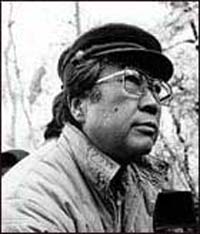Japan: prominent film director Shohei Imamura dies at 79

Imamura died of liver cancer, which he had been undergoing treatment for since last year, according to his son, Hirosuke.
Imamura won the top prize at the Cannes Film Festival for "The Ballad of Narayama" in 1983 and another for "The Eel" in 1997, the fourth director to win the Palme d'Or twice after American Francis Ford Coppola, Bille August of Denmark, and Sarajevo-born Emir Kusturica. Since then, Luc and Jean-Pierre Dardenne have jointly won the top prize twice, in 1999 and 2005.
The Tokyo-born director never received an Oscar nomination, according to the Academy of Motion Picture Arts and Sciences Web site. While he created masterpieces, they were harsh and failed to fill the American moviegoing appetite for upbeat adventure, the AP reports.
"The themes in his films weren't for Americans, but rather for Europeans," said Tadao Sato, a noted Japanese movie critic. "It would be difficult for Americans to grasp the convoluted state of mind depicted in his works in times after Japan's defeat of the past war."
"The Ballad of Narayama," one of his most haunting films, is set in an impoverished village in the 19th century. According to custom in this mythical village, families must bring their elderly members to a remote mountain to die when they reach age 70. For one son, following the custom is torture when he unwillingly abandons his mother on Mount Narayama.
"The Eel" is the story of a murderer whose only companion is a pet eel who gradually learns to get along with people after rescuing a girl who attempts suicide. Imamura kept an eel as a pet that he acquired during filming, but has said the comparison ended there.
Born in Tokyo in 1926, Imamura studied history at Tokyo's Waseda University before joining Japanese film company Shochiku Co. in 1951, and debuted as a director with "Stolen Desire" in 1958. He followed that with "My Second Brother" and "The Insect Woman," both of which brought him international recognition.
Actress Sumiko Sakamoto, who starred in "Ballad of Narayama," was quoted by Kyodo News agency as saying Imamura was a kind man who loved his characters deeply.
Another actor who worked with Imamura called him "a treasure" of Japanese cinema.
" I wanted to see many more films by Imamura," Koji Yakusho, who starred in "The Eel" and Imamura's 2001 film "Warm Water Under a Red Bridge," said in a statement.
Imamura developed a reputation for portraying the resilience and energy of common people, as in the 1961 satire "Pigs and Battleships."
The films "The Insect Woman" in 1963 and "Unholy Desire" in 1964 depict lives of lower-class, uneducated women forced to rely on their sexual instincts for survival.
"Vengeance is Mine" in 1979 and "Black Rain," a 1989 film, also won Imamura acclaim.
Subscribe to Pravda.Ru Telegram channel, Facebook, RSS!


